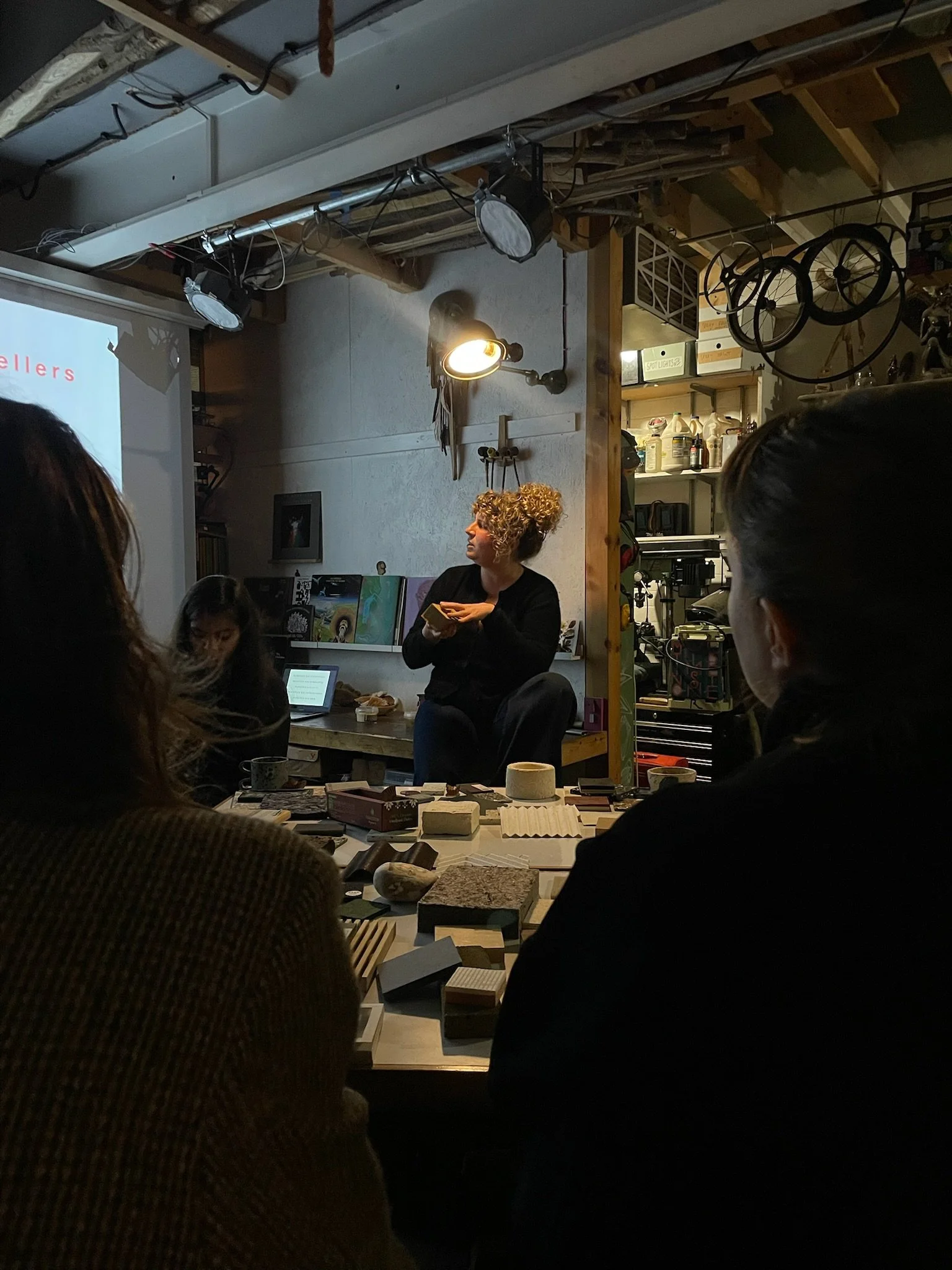 Image 1 of 4
Image 1 of 4

 Image 2 of 4
Image 2 of 4

 Image 3 of 4
Image 3 of 4

 Image 4 of 4
Image 4 of 4





Circular Design in Practice: Making Low-Impact Material Decisions | Online Session
Session Details
When: Wednesday 19th November 13.00 - 14.00 GMT
Format: 1 hour (live online session), Interactive presentation + Q&A
Level: Introductory / Applied
A link to join the online event will be emailed to you.
Building on my Materials Literacy 101 course, this one-hour online session shows you how to apply circular design in practice, using both quantitative and qualitative tools to make confident, low-impact material choices.
You’ll learn how to interpret data such as carbon, energy, and water impacts, and how to balance these figures with practical and ethical considerations.
By the end, you’ll have a clear workflow for circular decision-making, a low-impact materials checklist, and worksheets you can use in your own projects and practice.
About This Session
Choosing the right material is rarely straightforward; it involves understanding your priorities and boundaries for each project. It may also mean compromising and balancing between environmental, ethical, budgetary, and practical considerations.
In this session, we’ll explore how to make more informed decisions about materials by combining quantitative evidence with qualitative judgment.
You’ll learn:
How to read data such as embodied carbon, energy, and water footprint to evaluate options.
How to apply “common-sense” qualitative tools to reflect your project goals and circular values.
How to integrate end-of-life thinking at the design stage.
How to justify your material decisions with confidence, to clients, collaborators, and yourself.
You’ll also receive a decision-making worksheet pack with checklists and templates to guide your own practice.
This workshop helps you move from understanding to doing, turning circular principles into confident, measurable action.
Who It’s For
Designers
Architects, Interior Designers, Interior Architects
Makers, fabricators, and builders
Designer Makers
Specifiers, product developers, and educators
Design Educators
Anyone shaping the physical world or starting their circular journey
What You’ll Gain
Tools to evaluate materials using quantitative data (carbon, energy, water)
A qualitative framework for “common-sense” circular decision-making
A repeatable workflow for low-impact material selection
Practical worksheets and checklists to use on your own projects
Greater confidence in making and communicating sustainable material choices
What Participants Say
‘Thanks again for such an inspiring session - I always come away from your workshops feeling motivated and full of ideas.’
Olivia, Student / Interior Designer
‘Massive thank you for today, absolutely fantastic session. I have personally learnt a lot, which never really happens in my role anymore, some super thought-provoking topics.
Participant, No7 Beauty Group
‘Incredibly informative—opened my eyes to new materials and ways of thinking about design. Highly recommend!’
Online Workshop Attendee
Ticket Types
Low-Income and Student tickets are issued on a trust basis. Above and Beyond tickets help support the education of those on low incomes, studying, or transitioning careers by paying it forward.
Session Details
When: Wednesday 19th November 13.00 - 14.00 GMT
Format: 1 hour (live online session), Interactive presentation + Q&A
Level: Introductory / Applied
A link to join the online event will be emailed to you.
Building on my Materials Literacy 101 course, this one-hour online session shows you how to apply circular design in practice, using both quantitative and qualitative tools to make confident, low-impact material choices.
You’ll learn how to interpret data such as carbon, energy, and water impacts, and how to balance these figures with practical and ethical considerations.
By the end, you’ll have a clear workflow for circular decision-making, a low-impact materials checklist, and worksheets you can use in your own projects and practice.
About This Session
Choosing the right material is rarely straightforward; it involves understanding your priorities and boundaries for each project. It may also mean compromising and balancing between environmental, ethical, budgetary, and practical considerations.
In this session, we’ll explore how to make more informed decisions about materials by combining quantitative evidence with qualitative judgment.
You’ll learn:
How to read data such as embodied carbon, energy, and water footprint to evaluate options.
How to apply “common-sense” qualitative tools to reflect your project goals and circular values.
How to integrate end-of-life thinking at the design stage.
How to justify your material decisions with confidence, to clients, collaborators, and yourself.
You’ll also receive a decision-making worksheet pack with checklists and templates to guide your own practice.
This workshop helps you move from understanding to doing, turning circular principles into confident, measurable action.
Who It’s For
Designers
Architects, Interior Designers, Interior Architects
Makers, fabricators, and builders
Designer Makers
Specifiers, product developers, and educators
Design Educators
Anyone shaping the physical world or starting their circular journey
What You’ll Gain
Tools to evaluate materials using quantitative data (carbon, energy, water)
A qualitative framework for “common-sense” circular decision-making
A repeatable workflow for low-impact material selection
Practical worksheets and checklists to use on your own projects
Greater confidence in making and communicating sustainable material choices
What Participants Say
‘Thanks again for such an inspiring session - I always come away from your workshops feeling motivated and full of ideas.’
Olivia, Student / Interior Designer
‘Massive thank you for today, absolutely fantastic session. I have personally learnt a lot, which never really happens in my role anymore, some super thought-provoking topics.
Participant, No7 Beauty Group
‘Incredibly informative—opened my eyes to new materials and ways of thinking about design. Highly recommend!’
Online Workshop Attendee
Ticket Types
Low-Income and Student tickets are issued on a trust basis. Above and Beyond tickets help support the education of those on low incomes, studying, or transitioning careers by paying it forward.
